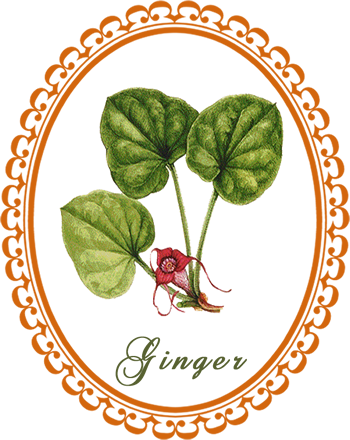
Ginger: for anyone suffering from chilblains, Raynaud's disease, or other problems due to poor circulation, ginger is like an internal hot-water bottle ...
Common Names: Ginger
Botanical Name: Zingiber officinale
Family: Zingiberaceae
Plant Type: Creeping perennial
Parts Used: Roots
Ginger is said to be a native of Asia. It is cultivated in West Indies, Jamaica and Africa.
Description: Ginger is a perennial root which creeps and increases underground, in tuberous joints; in the spring it sends up from its roots a green reed, like a stalk, 2 feet high, with narrow lanceolate leaves; these die down annually. The flowering stalk rises directly from the root, ending in an oblong scallop spike; from each spike a white or yellow bloom grows.
Cultivation: Ginger is a tropical plant only hardy to zone 9. It is a perennial, and prefers fertile, moist, well-drained soil in part sun.
Culinary Uses: The flavor of ginger is a spicy citrus. The root is used in the cuisine of Asia, East India, the Caribbean, and North Africa. Sliver some fresh and add to your favorite stir-fry. Dried ginger is used in many desserts besides the traditional gingerbread.
Ginger Magick
Love. Money. Success. Power.
Gender: Masculine
Planet: Mars
Element: Fire
Eat ginger before doing a spell to increase its power.
Ginger root, because of its gnarled shape, can substitute for mandrake.
To cleanse an area and dispel any negative energy, burn some dried ginger as incense.
Plant and grow whole ginger roots or sprinkle ginger powder into your pockets to attract money.
Herbal Healing with Ginger
Medicinal Actions: Analgesic, antibacterial, anticoagulant, antiemetic, anti-inflammatory, antioxidant, antiscorbutic, antiseptic, antispasmodic, antitoxic, antitussive, aperitif, aperitive, aphrodisiac, astringent (stops bleeding), carminative, cephalic, diaphoretic, digestive (nausea), diuretic, emmenagogue, expectorant, febrifuge, laxative, rubefacient, stimulant (circulatory and nervous systems), stomachic, tonic, tonifying (digestive system), vermifuge
Medicinal Uses: Ginger is used to soothe indigestion and treat motion sickness. Ginger tea is a tried and true remedy for morning sickness. It is a diaphoretic and promotes peripheral circulation; like other hot spices, it stimulates the circulation and can provoke a sweat that will cool down or reduce a fever. Gargle with an infusion of ginger to treat a sore throat. Use it as a poultice to treat muscle spasms. If you put ginger on the skin, whether it is grated or used as a wash in tea or tincture form, it will bring a flush to that area, easing inflammation and soothing pain.
Body Care with Ginger
To relieve acid reflux, or intestinal gas or cramps, take 1 cup ginger infusion three times daily.
For travel sickness, take 1 teaspoon ginger tincture in a little water or juice up to three times daily.
Infusion: Steep 1 teaspoon dried ginger powder or 2.5 cm (1 inch) grated fresh ginger root in 1 cup just-boiled water for 5 minutes. Strain, add lemon to taste, and drink.
Tincture: 200g (7 oz) dried ginger powder or 400g (14 oz) grated fresh ginger root in 1 litre (4 cups) vodka-water mix.
Source: The Essential Herbs Handbook by Lesley Bremness
If you appreciate the information provided,
please help keep this website running. Blessings!
© 2008-2025 aromaworx.ca. All rights reserved.

